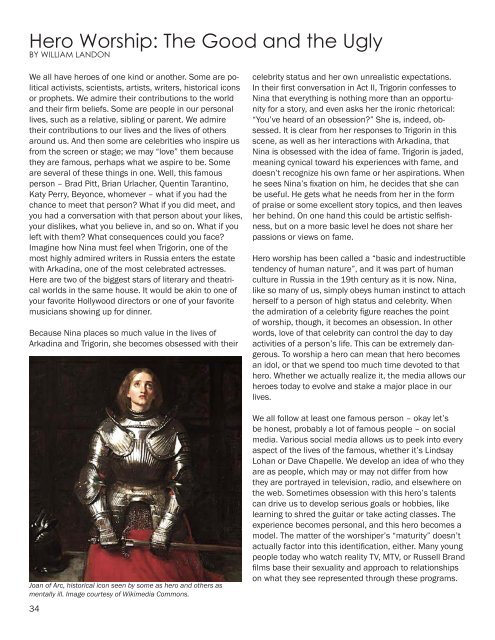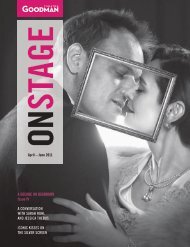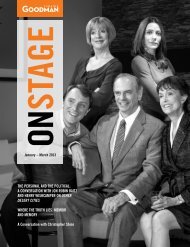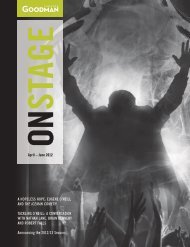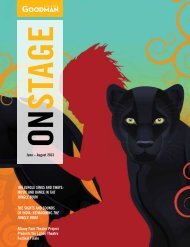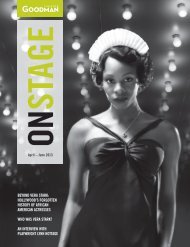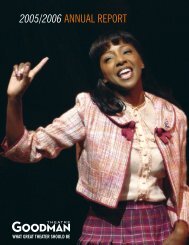The Seagull Study Guide (12MB) - Goodman Theatre
The Seagull Study Guide (12MB) - Goodman Theatre
The Seagull Study Guide (12MB) - Goodman Theatre
You also want an ePaper? Increase the reach of your titles
YUMPU automatically turns print PDFs into web optimized ePapers that Google loves.
Hero Worship: <strong>The</strong> Good and the Ugly<br />
BY WILLIAM LANDON<br />
We all have heroes of one kind or another. Some are political<br />
activists, scientists, artists, writers, historical icons<br />
or prophets. We admire their contributions to the world<br />
and their firm beliefs. Some are people in our personal<br />
lives, such as a relative, sibling or parent. We admire<br />
their contributions to our lives and the lives of others<br />
around us. And then some are celebrities who inspire us<br />
from the screen or stage; we may “love” them because<br />
they are famous, perhaps what we aspire to be. Some<br />
are several of these things in one. Well, this famous<br />
person – Brad Pitt, Brian Urlacher, Quentin Tarantino,<br />
Katy Perry, Beyonce, whomever – what if you had the<br />
chance to meet that person? What if you did meet, and<br />
you had a conversation with that person about your likes,<br />
your dislikes, what you believe in, and so on. What if you<br />
left with them? What consequences could you face?<br />
Imagine how Nina must feel when Trigorin, one of the<br />
most highly admired writers in Russia enters the estate<br />
with Arkadina, one of the most celebrated actresses.<br />
Here are two of the biggest stars of literary and theatrical<br />
worlds in the same house. It would be akin to one of<br />
your favorite Hollywood directors or one of your favorite<br />
musicians showing up for dinner.<br />
Because Nina places so much value in the lives of<br />
Arkadina and Trigorin, she becomes obsessed with their<br />
Joan of Arc, historical icon seen by some as hero and others as<br />
mentally ill. Image courtesy of Wikimedia Commons.<br />
34<br />
celebrity status and her own unrealistic expectations.<br />
In their first conversation in Act II, Trigorin confesses to<br />
Nina that everything is nothing more than an opportunity<br />
for a story, and even asks her the ironic rhetorical:<br />
“You’ve heard of an obsession?” She is, indeed, obsessed.<br />
It is clear from her responses to Trigorin in this<br />
scene, as well as her interactions with Arkadina, that<br />
Nina is obsessed with the idea of fame. Trigorin is jaded,<br />
meaning cynical toward his experiences with fame, and<br />
doesn’t recognize his own fame or her aspirations. When<br />
he sees Nina’s fixation on him, he decides that she can<br />
be useful. He gets what he needs from her in the form<br />
of praise or some excellent story topics, and then leaves<br />
her behind. On one hand this could be artistic selfishness,<br />
but on a more basic level he does not share her<br />
passions or views on fame.<br />
Hero worship has been called a “basic and indestructible<br />
tendency of human nature”, and it was part of human<br />
culture in Russia in the 19th century as it is now. Nina,<br />
like so many of us, simply obeys human instinct to attach<br />
herself to a person of high status and celebrity. When<br />
the admiration of a celebrity figure reaches the point<br />
of worship, though, it becomes an obsession. In other<br />
words, love of that celebrity can control the day to day<br />
activities of a person’s life. This can be extremely dangerous.<br />
To worship a hero can mean that hero becomes<br />
an idol, or that we spend too much time devoted to that<br />
hero. Whether we actually realize it, the media allows our<br />
heroes today to evolve and stake a major place in our<br />
lives.<br />
We all follow at least one famous person – okay let’s<br />
be honest, probably a lot of famous people – on social<br />
media. Various social media allows us to peek into every<br />
aspect of the lives of the famous, whether it’s Lindsay<br />
Lohan or Dave Chapelle. We develop an idea of who they<br />
are as people, which may or may not differ from how<br />
they are portrayed in television, radio, and elsewhere on<br />
the web. Sometimes obsession with this hero’s talents<br />
can drive us to develop serious goals or hobbies, like<br />
learning to shred the guitar or take acting classes. <strong>The</strong><br />
experience becomes personal, and this hero becomes a<br />
model. <strong>The</strong> matter of the worshiper’s “maturity” doesn’t<br />
actually factor into this identification, either. Many young<br />
people today who watch reality TV, MTV, or Russell Brand<br />
films base their sexuality and approach to relationships<br />
on what they see represented through these programs.


